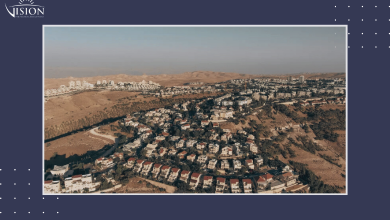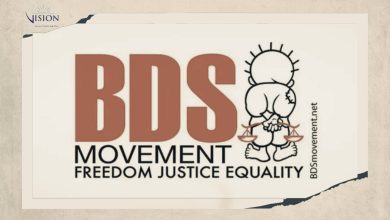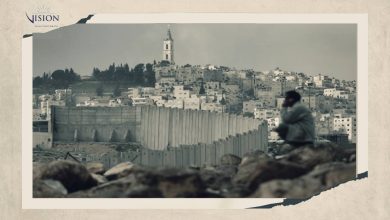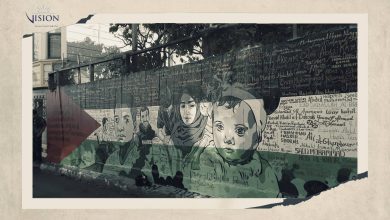The Monthly Skimm (May 2021): Contexts, Reasons, and Consequences of the Latest Confrontation Between the Palestinians and Israelis.
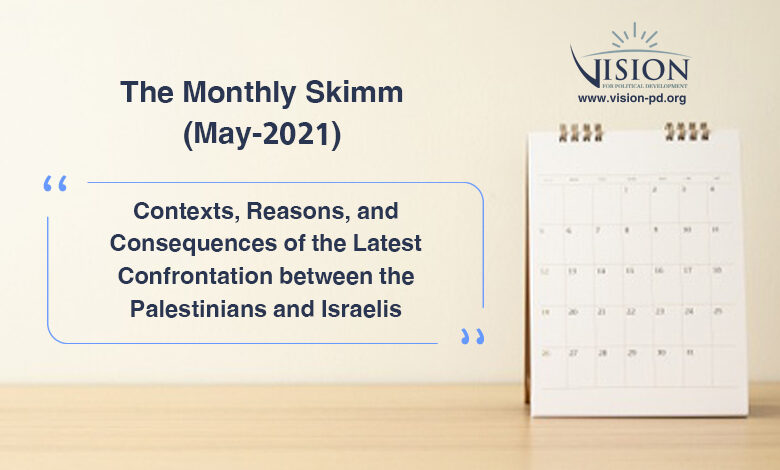
Mohammed Hasan
A Victory of Hamas
Political leaders and high Israeli military officials were notably surprised from the unprecedented attacks from Hamas with respect to their quantity and quality. This helped Hamas leaders project the image of victory from their last battle. Despite the token victory, Itai Brun, in his article published on the Institute for National Security Studies, doubt it played a significant role in changing the basic situation (Brun, 2021).
Winning the Cognitive Campaign
In the article “The Cognitive Campaign in Operation Guardian of the Walls: The Battle over the Narrative,” three Israeli authors acknowledge that Hamas had the upper hand in the battle, and achieved a huge cognitive achievement, but writer (David Siman Tov, 2021) tried to show that what appeared in the media did not reflect the reality. Israel’s biggest achievement in the campaign was to use its immense military to destroy sensitive infrastructure belonging to the Hamas as well as destroying vital infrastructure of the strip in general.
The “Exchange” of Rockets between Hamas and Israel exposed some realities according to Dennis Ross (Ross, 2021); first, the Palestinian cause cannot be dismissed. The Israeli assumption that bypassing the Palestinians by normalizing relations with Arab countries would solve the conflict was wrong. Second, Jerusalem is still igniting the conflict, particularly when Palestinian existence is threatened, and when the religious sites are affected. Third, Hamas threatens any hope for future peace.
Reasons of the confrontation
In a discussion published by the Washington Institute (Institute, 2021), the researchers concluded that one factor that triggered the latest events was the political vacuum on both sides. The events showed that people from both sides felt a sense of despair about the conflict resolution. Importantly, Israel and the United States missed opportunities to empower Mahmud Abbas. That gave Hamas the upper hand to replace the PA. In order to restore the diplomatic path and empower the position of Palestinian peace seekers, the United States must work closely with the PA leaders.
1- An economic factor
Michael Ruben is a pro-Israel senior writer in the American Enterprise Institute. In his analysis entitled “Hamas Rockets and Iranian Drones: A war of Economic Attrition Against Israel?” (Ruben, 2021), he describes Israel’s economic loss due to Gazan rocket attacks. Every use of Iron Dome costs nearly 100$ million usd, and every interceptor cost $40,000$ to $80,000 USD. In the last confrontation, Iron Dome intercepted 2500 rockets at a cost of 100$ million USD. The writer did not separate the Israeli Economic loss from the regional economic contest. He sees the Iranian and Turkish support for Gaza in a regional economic context. This threat to Israel is not due to the short-run results, but it does influence the position of Israel regionally. The competition in the drone development area between Iran, turkey, and Israel is not far away from this context.
2- Abraham Accords is Another Reason for the Instability
Rather than promoting conflict resolution, the Accords is a significant reason for the recent events in that the diplomatic method that required substantial Palestinian involvement was disabled, and Trump’s administration succeeded in marginalizing the Palestinian voice and underestimating its heaviness in the political equation (Shinkman, 2021). From an economic perspective, Karen Young In his article in the Bloomberg Opinion, emphasizes how weak the economic promises of Abraham Accords are (Young, 2021). The economic side of the Accords was based on a people-to-people business relationship. However, the events witnessed in the last three weeks threatened all of the economic promises. Investors from the Gulf would face an awkward situation as Norwegian firms dropped from Israeli West Bank investments. Also, the promises were based on the overestimation future Gulf tourism to Israel.
3- The Failure in Israeli Political Construction
Despite the intention of Palestinian Islamist leader Mansour Abbas to promote a minimum level of fraternity between the Arabs and Israelis, the recent riots indicated a failure in the political structure which led to the rioting. These events would have long-term consequences (Beauchamp, 2021).
How Would Israel Work to Get Out of its Dilemma Based on the Suggestions of Pro-Israeli Intellectuals?
David Pollock in his article published by Washington Institute attempts to help Israel getting out of its latest crises (Pollock, 2021). He recommends direct Israeli “human aid” to Gaza and that Turkey and Qatar must push for this. For him this would increase the opportunities for peace while also repairing Israel’s damaged international reputation. He warns Israel about positioning Hamas as the protector of Palestinians in. In other words, Israel must re-consider its approach and involve the Palestinian Authority. Relief, reconstruction, and a long-term cease-fire is a better choice for Israel. Furthermore, Israel must lobby Turkey and Qatar in order stop backing Hamas.
In his article published on the Institute for National Security Studies “Operation Guardian of the Walls: Envisioning the End”. Udi Dekel recommends that the Israeli Government the following (Dekel, 2021):
- Any coming arrangement should be made with the PA leaders over Hamas. This would deprive Hamas recognition, achievement, and status.
- Keep the siege on the strip at the same level it was preceding the battle, and any international attempts to reconstruct the Gaza Strip must prevent the institutionalization of military buildup. Construction must be through the PA.
- International reconstruction must exclude Qatar, Turkey, and Iran. Instead, the pragmatic Arab countries must be involved in the process.
- Activities involving Jewish extremist groups must be restricted.
- The status of Jordan over holly sites must be strengthened.
- A sense of hope must be given to Palestinian groups out of the armed Palestinian group circles.
The Way How EU Should Re-Approach the Conflict
Instabilities within the Palestinian-Israeli conflict are considered by Przemyslaw Osiewicz to be a direct threat to the EU (Osiewicz, 2021). The European countries see the Two-State solution as the ideal way to resolve the conflict. However, the author admits that this has become wishful thinking with little opportunity of actually getting implemented. Thus, he recommends that the EU proceeds from words to deeds by activating the Middle East Quartet and working with the Biden administration to protect human rights and the civilian population.
Chinese New Political Language Towards the Conflict
There is a degree of dissatisfaction amongst the Israelis towards China regarding the last event. The Israel perception is that China stood with the Palestinian side. This is one aspect of the international competition between the two powers. China tried to slap the US as the latter has been bringing attention to the Muslim minority in China. The Chinese speech included language detailing what the “Palestinian Muslims” are facing from the Israelis. This international escalation between two powers will strategically challenge the national Israeli interests. Accordingly, the Palestinian cause benefits (Propper, 2021).
References:
- Beauchamp, Z. (2021, 5). Israel’s unraveling. Retrieved from VOX: https://www.vox.com/world/2021/5/15/22436068/israel-violence-lod-bat-yam-jerusalem-lynching-arab-jewish-palestinian
- Brun, I. (2021, 5). Operation Guardian of the Walls: Two Parallel Dimensions and Three Stark Surprises. Retrieved from The Institute for National Security Studies : https://www.inss.org.il/publication/war-in-two-dimensions/
- David Siman Tov. (2021, 5). The Cognitive Campaign in Operation Guardian of the Walls: The Battle over the Narrative. Retrieved from The Institute for National Security Studies : https://www.inss.org.il/publication/guardian-of-the-walls-narrative/
- Dekel, U. (2021, 5). Operation Guardian of the Walls: Envisioning the End. Retrieved from The Institute for National Security Studies: https://www.inss.org.il/publication/operation-ending/
- Institute, W. (2021, 5). Hamas-Israel Violence: Context and Trajectory. Retrieved from Washington Institute: https://www.washingtoninstitute.org/policy-analysis/hamas-israel-violence-context-and-trajectory
- Osiewicz, P. (2021, 5). Amid the escalating violence in Israel and Palestine, can the EU move from words to deeds? Retrieved from Middle East Institute: https://www.mei.edu/publications/amid-escalating-violence-israel-and-palestine-can-eu-move-words-deeds
- Pollock, D. (2021, 5). After the Gaza Cease-Fire, What Next? . Retrieved from Washington Institute: https://www.washingtoninstitute.org/policy-analysis/after-gaza-cease-fire-what-next
- Propper, E. (2021, 5). China, the United States, and the Gaza Crisis: Israel for Xinjiang? Retrieved from The Institute of National Security Studies: https://www.inss.org.il/publication/guardian-of-the-walls-china/
- Ross, D. (2021, 5). How the World Could Help End the Israeli-Palestinian Conflict—and Prevent Future Clashes . Retrieved from Washington Institute: https://www.washingtoninstitute.org/policy-analysis/how-world-could-help-end-israeli-palestinian-conflict-and-prevent-future-clashes
- Ruben, M. (2021, 5). Hamas rockets and Iranian drones: A war of economic attrition against Israel? . Retrieved from American Enterprise Institute: https://www.aei.org/op-eds/hamas-rockets-and-iranian-drones-a-war-of-economic-attrition-against-israel/
- Schweitzer, Y. (2021, 5). Operation Guardian of the Walls: Where Was Hezbollah? Retrieved from The Institute for National Security Studies: https://www.inss.org.il/publication/hezbollah-guardian-of-the-walls/
- Shinkman, P. (2021, 5). How the Abraham Accords Precipitated New Israeli-Palestinian Violence. Retrieved from US News: https://www.usnews.com/news/world-report/articles/2021-05-13/how-the-abraham-accords-precipitated-new-israeli-palestinian-violence
- Young, K. (2021, 5). Israel’s Abraham Accords Dividend Is in Doubt. Retrieved from Bloomberg: https://www.bloomberg.com/opinion/articles/2021-05-27/abraham-accords-gaza-war-queers-israel-s-arab-outreach


